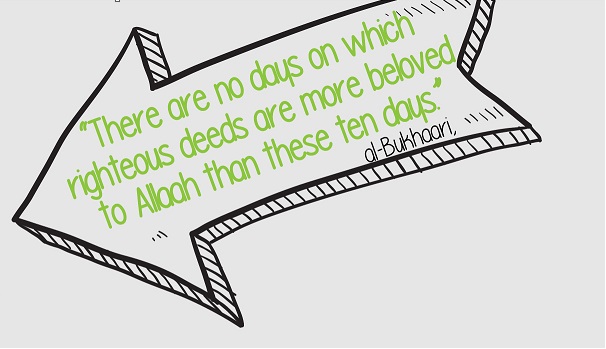Among the great seasons of worship are the first ten days of Dhu’l-Hijjah, which Allah (subḥānahu wa taʿālā) has favoured over other days. It was narrated from Ibn ‘Abbaas (raḍiy Allāhu ʿanhu) that the Prophet (sall Allāhu ʿalayhi wa sallam) said: “There are no days on which righteous deeds are more beloved to Allah than these ten days.” They said: “Not even jihad for the sake of Allah?” He said: “Not even jihad for the sake of Allah, unless a man goes out himself for jihad taking his wealth with him and does not come back with anything.”1
It was also narrated from Anas (raḍiy Allāhu ʿanhu) that the Prophet (sall Allāhu ʿalayhi wa sallam) said: “There is no deed that is better before Allah or more greatly rewarded than a good deed done in the (first) ten days of al-Adha.” It was said: “Not even jihad for the sake of Allah?” He said: “Not even jihad for the sake of Allah, unless a man goes out himself for jihad taking his wealth with him and does not come back with anything.”2
These texts and others indicate that these ten days are better than all other days of the year, with no exception, even the last ten days of Ramadān. But the last ten nights of Ramadān are better than the first ten nights of Dhu’l-Hijjah, because they include Laylat al-Qadr, which is better than a thousand months.
So the Muslim should start these days with sincere repentance to Allah (subḥānahu wa taʿālā), then he should do a lot of righteous deeds in general, then he should pay attention to doing the following deeds:
1. Fasting
It is Sunnah for a Muslim to fast on the first nine days of Dhu’l-Hijjah, because the Prophet (sall Allāhu ʿalayhi wa sallam) encouraged us to do righteous deeds in the first ten days of Dhu’l-Hijjah, and fasting is one of the best of deeds, which Allah has chosen for Himself.3
It was narrated from Hunaydah ibn Khaalid from his wife, that one of the wives of the Prophet (sall Allāhu ʿalayhi wa sallam) said: The Prophet (sall Allāhu ʿalayhi wa sallam) used to fast on the first nine days of Dhu’l-Hijjah and the day of ‘Ashoora’, and three days each month, the first Monday of the month and two Thursdays.4
2 – Reciting tahmeed, tahleel and takbeer abundantly
It is Sunnah to recite takbeer (saying Allaahu akbar (Allah is most great)), tahmeed (saying al-hamdu Lillah (praise be to Allah)), tahleel (saying Laa ilaaha ill-Allaah (There is no god but Allah)) and tasbeeh (saying Subhaan-Allah (Glory be to Allah)), during the first ten days of Dhu’l-Hijjah, saying these words out loud in the mosques, homes, streets and every place in which it is permissible to remember Allah (subḥānahu wa taʿālā), to perform this act of worship openly and proclaim the greatness of Allah (subḥānahu wa taʿālā).
Men should recite out loud and women should recite quietly.
Allah says: “That they may witness benefits for themselves and mention the name of Allah on known days over what He has provided for them of [sacrificial] animals. So eat of them and feed the miserable and poor.” [al-Hajj 22:28]
The majority are of the view that the “appointed days” are the first ten days of Dhu’l-Hijjah, because it was narrated from Ibn ‘Abbaas (raḍiy Allāhu ʿanhu) that the appointed days are the first ten days of Dhu’l-Hijjah.
It was narrated from ‘Abd-Allaah ibn ‘Umar (raḍiy Allāhu ʿanhu) that the Prophet (sall Allāhu ʿalayhi wa sallam) said: “There are no days that are greater before Allah or in which good deeds are more beloved to Him, than these ten days, so recite a great deal of tahleel, takbeer and tahmeed during them.”5
The takbeer is as follows:
Allaahu akbar, Allaahu akbar, laa ilaaha ill-Allaah, Allaahu akbar, wa Lillaah il-hamd (Allah is Most Great, Allah is Most Great, there is no god but Allah; Allah is Most Great and to Allah be praise).
3 – Doing Hajj and ‘Umrah
One of the greatest deeds that can be done during these ten days is Hajj to the sacred House of Allah (subḥānahu wa taʿālā). Whoever Allah (subḥānahu wa taʿālā) helps to go on Hajj to His House and do the rituals in the required manner will – in sha Allah – be included in the words of the Messenger of Allah (subḥānahu wa taʿālā) “An accepted Hajj brings no less a reward than Paradise.”
4 – Udhiyah (sacrifice)
One of the righteous deeds that bring a person closer to Allah in these ten days is to slaughter the sacrifice and to look for a good, fat animal and to spend money on it for the sake of Allah (subḥānahu wa taʿālā).
Let us hasten to make the most of these great days, before the negligent regrets what he did, and before he asks to go back and receives no response.
[donationbanner]
Source: www.islam21c.com
[1] Narrated by al-Bukharee, 2/457
[2] Narrated by al-Daarimi, 1/357; its isnaad is hasan as stated in al-Irwa’, 3/398.
[3] A hadeeth quds states: “Allaah says: ‘All the deeds of the son of Adam are for him, except fasting, which is for Me and I shall reward for it.”
[4] Narrated by al-Bukhaari, 1805.
[5] Narrated by al-Nasaa’i, 4/205 and by Abu Dawood; classed as saheeh by al-Albaani in Saheeh Abi Dawood, 2/462.
[6] Narrated by Ahmad, 7/224; its isnaad was classed as saheeh by Ahmad Shaakir.
This article was originally posted by Islamic Online University – read here










Assalmualaikum,
Great article with very good and useful information, thank you so much for sharing such good info.
I have already started my process for hajj 2020 with the help of http://www.cordobahajj.com
I made out some notes from the article to follow it while performing my Hajj, hope you don’t mind.
Please any suggestions from anyone reading this are welcomed.
Thank you,
Assalamulaikum